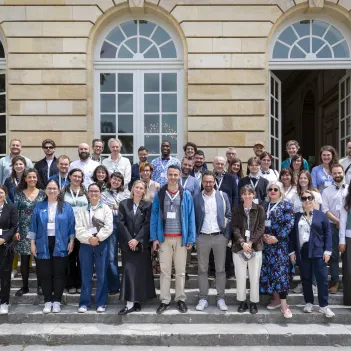Reflections from the DUT City Panel

Participants of the DUT City Panel in front of Bordeaux city hall.
© JB Menges
The annual city panel marks one of the highlights of the DUT year. As Christoph Gollner, Coordinator of the Positive Energy Districts pathway at DUT puts it: “For the strategic development of the DUT Partnership it is important to have a panel where cities come together to discuss and tell us about their needs, challenges, strategies, and ambitions. We started two years ago in Vienna. Last year we were in Umeå and this year in Bordeaux – always great occasions of exchange and mutual inspiration.”
This year’s event brought together 37 participants from 13 countries and 32 cities. From the outset, the two days were highly interactive and combined a variety of formats such as interviews, world cafés, peer-to-peer coaching, presentations from different cities, and a fishbowl discussion. Additionally, three site visits were organised to Bordeaux central station, Bordeaux Grandeur Nature, and the Ginko Eco Neighbourhood.
Placing vulnerabilities at the centre
The event took place under the theme of “Solidarities in Tackling Social and Environmental Vulnerabilities.” It highlights the connection between social and climate policies as climate change affects vulnerable communities more than others. Bordeaux, the host town of this year’s City Panel, has hands-on experience in dealing with external shocks and vulnerabilities: “We have high flood risks, but we also see more and more sudden rains and heatwaves that are more and more frequent with big impacts on the population and especially older people. Climate change further has consequences on buildings, and it is very complicated to anticipate them”, outlined Celine Papin, Deputy Mayor of Bordeaux and Vice-President of Bordeaux Metropole during a panel discussion. Under the theme of social and environmental vulnerabilities, a variety of topics were brought up during the two days including bicycle lanes, digitalisation, greening, energy, and even youth crime.

© Charlotte Barbier
Continuity is needed to build resilience
At the end of two days of discussions, the participants gathered in a circle to harvest their takeaways. One thing that became apparent was that building resilience requires short- and long-term planning. But being able to plan in the long run is not always a given. City panel participants highlighted how changes in the political landscape often led to the discontinuation of promising projects and the loss of valuable time in the fight against climate change. One of the solutions raised in this regard was the so-called X-curve framework that divides measures into the phase out of harmful practices and phase in of alternatives. Depending on the political climate, cities can lay more focus on one or the other to ensure progress even in a more challenging climate.
If you want to go far – be brave
Another key takeaway from this year’s event became apparent already early in the programme: Bravery is key, and it can take you a long way. During a site visit to Bordeaux Grandeur Nature, Deputy Mayor Didier Jeanjean, in charge of nature in the city and peaceful neighbourhoods, outlined a variety of projects in the inner city that aim to reduce heat and pollution, as well as increase biodiversity.
Jeanjean highlighted that the city aims to work in every school to create greener spaces with more biodiversity. According to Jeanjean, this is especially important as schools reach many people in society. An important aspect of the presentation was that the doubts around new projects were the strongest before or during the project start: “In 2020 it was difficult. We said you have to trust us. Today, it is easier to convince people of the benefits of a greener city”, explained Jeanjean.
Connect to YouTube?
To play this video, a connection to YouTube will be established, and personal data will be transmitted to YouTube.
Celine Papin, Deputy Mayor of Bordeaux and Vice-President of Bordeaux Metropolis gives an example of an environmental and social vulnerability the city is facing and how it is being addressed.
Connect to YouTube?
To play this video, a connection to YouTube will be established, and personal data will be transmitted to YouTube.
Pierre Pacaud, Deputy Scientifivc Director at the Minitry of Higher Education, Research, and Innovation, France, reflects on the City Panel's theme Solidarities in Tackling Environmental and Social Vulnerabilities.
Pragmatism is the way to go
Pragmatism was another component of the discussions that shone up repeatedly. Participants emphasised that adapting on the way, and implementing projects and measures even with limitations was at times a natural part of the process be it due to the high density of a city, resistance against change, or financial constraints. As one participant pointed out: “You need to work with what you have.”
In terms of creating greener cities, this can mean focusing on green south-facing walls for cooling when cities are particularly dense and the catalogue of measures that can be implemented is short. Another idea that was brought up in such cases was a dedicated high-quality nature space within the dense urban areas – such as Central Park in New York City.
The value of European exchanges
The 2025 DUT City Panel showed how much can be learned from one another as cities face the same challenges and often apply similar solutions even if details vary. As one participant highlighted when reflecting on the City Panel: “The best thing for me is to see so many faces from other places that work on the same challenges. That helps a lot.” Another one added: “I feel strengthened in what we can do as cities”. The next DUT City Panel event will happen on 23rd of October 14-17 (CET) online.